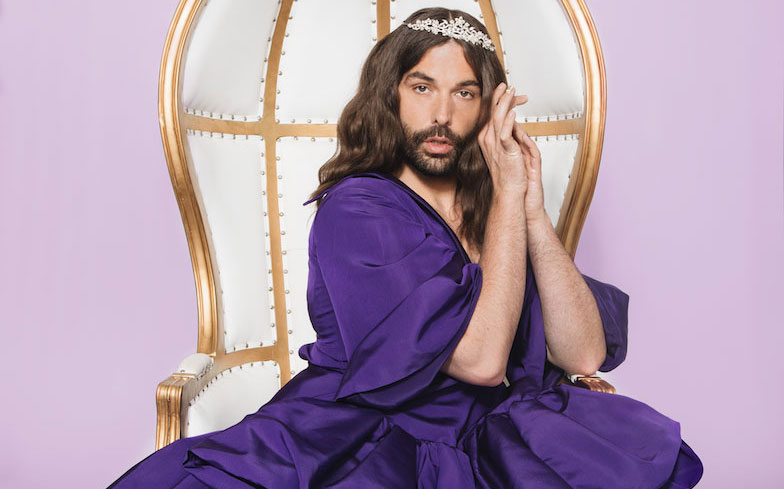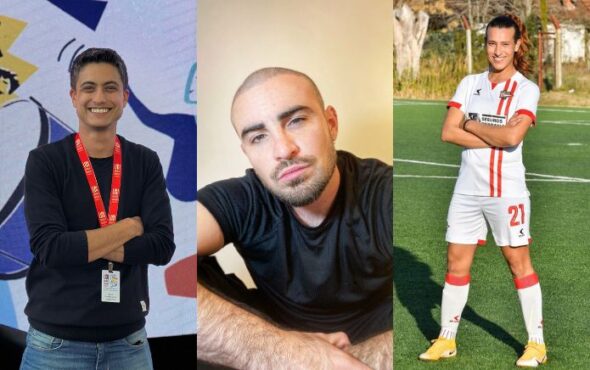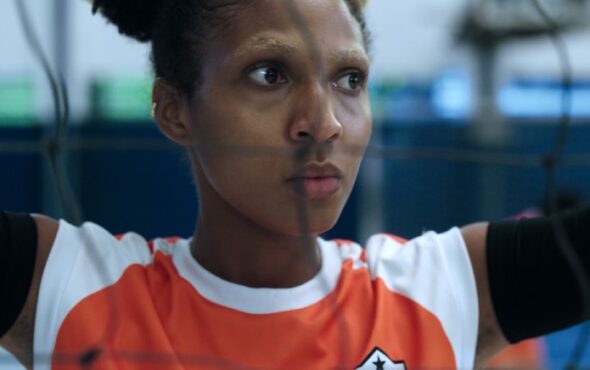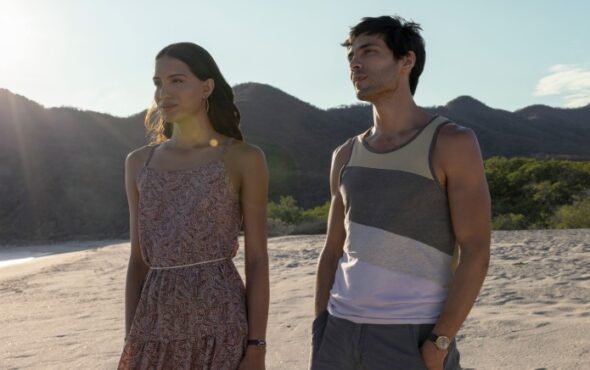
In September 2019, Queer Eye’s resident grooming expert Jonathan Van Ness reveal to the world he has HIV.
In an extract published via The New York Times to coincide with the release of his new book, Over The Top, Jonathan spoke about being an addict and sexual abuse survivor. It’s a conversation he’s waited to have.
“If you’re a survivor of abuse or any of the things I’ve been through, you’re almost waiting for that issue to drop so I was pretty scared,” he tells us as we meet in Central London.
“I was trying to process all of my feelings around it because it’s not like you come to a place of acceptance and you’re guaranteed to never have a moment of struggling, or if you’re sure if you want to be this person and fight these fights and battles. I am. I need to continue to fight these battles.”
And while his honesty has brought him great love and support from others, Jonathan explains that it’s tough for people to see every part of you. And sometimes, just sometimes, it can go wrong.
“I’ve never ugly cried from looking at stuff on Twitter but that two days had me in the fetal position,” Jonathan explains with great calm as we discuss cancellation culture, something he’s been part of after a video surfaced from early 2018 in which he made remarks about President Reagan.
“I understand that critique of not knowing me and being able to make that judgement. But if you have the context of my book, my podcast, all the work I do in the mental health space and HIV/AIDS awareness, body-positivity space and all the things I do, I feel like you wouldn’t have such a vitriolic feeling with people within the community saying such hardcore mean things. That was the most I’ve ever felt so personally.”
Almost two months later, a North American and Europe tour under his belt via his live show Road To Beijing, and Over The Top receiving international acclaim, we speak exclusively to Jonathan about his experiences of cancellation culture, how he’s happy to become a spokesperson for those living with HIV, and why he decided to release a book.

How have you been since Over The Top came out?
Well… it’s been really busy! On a more physical level, I’ve been pretty non-stop since September 24th. On an emotional and mental level, it’s nice to have it be well received. I didn’t really know how it was going to be so it was nice to feel that I didn’t wake up to a completely different world. I think a lot of times, if you’re a survivor of abuse or any of the things I’ve been through, you’re almost waiting for that issue to drop, so I was pretty scared. It’s nice to come into everything with all of myself. It’s nice to be all the way transparent in that way, which is really nice. Nice? I won’t say nice again, I’m really sorry.
How has life changed since the book’s release? Has your stardom risen once again?
Actually I almost feel like I have a bit more space. I feel like people are like, ‘Oh my gosh, they’ve really been through a lot. Let them have their moment!’ [Laughs] There has been a lot of people living with HIV and struggling with their status, or newly diagnosed or especially diagnosed in other countries, who have all shared so much with me. That has been really amazing and powerful, and I think a lot of the experiences people have shared with me have driven home for me that I wanted to do so much more and speak more in the activism space for HIV and AIDS. I was trying to process all of my feelings around it because it’s not like you come to a place of acceptance and you’re guaranteed to never have a moment of struggling, or if you’re sure if you want to be this person and fight these fights and battles. I am. I need to continue to fight these battles.

Your honesty has made you a key reference when having these types of discussions around HIV. How do you feel about being seen as a spokesperson?
It’s part of why I was scared to talk about it in the first place because when you talk about living with HIV, other peoples’ reaction is to identify you as HIV-positive first and foremost before anything else about you. I think there’s so much well-meaning stigmatisation around people living with HIV. There’s so many people that have said they’re ‘sorry’ for my diagnosis having read The New York Times article, but not my book. This diagnosis is seven years old. I’ve only gotten healthier and stronger. I’ve learned to love myself and take care of myself because of how that happened. It was always my biggest fear, or one of them. This story is me taking one of my biggest fears and using it to turn my life around. It wasn’t in one swoop but a lot of hard work. It’s not a doom and gloom story. I was scared if I wanted to be the spokesperson for that and if that is all I would ever be. After that first year and a half, I always knew I could remove that part of my story if I felt I wasn’t ready for it. Nobody ever told me I had to and a lot of people have asked me if I was sure I wanted to do it. I always felt really sure and clear I wanted to do it in this way and knew this would be a jumping off point to continue my advocacy and be more of who I want to be on this platform. I’ve been through some stuff and so I had to make sure I was ready for it. I also feel like I’m new to the scene in so many respects for entertainment, comedy, writing, but I do feel I can, and am, seen as still a layered person. I think people living with HIV can be seen as however we want to be seen.
It’s not to define, but to be part of you.
Yes. Exactly.
It must be so wonderful to get to show us all the real Jonathan Van Ness?
Yeah, and I don’t feel so weird that I just got teary right now. It is a relief!
You are so many different things and this book is the best example of that.
[Pause due to emotion.]

Have you read it all back since the release?
Yeah.
How do you feel about it all now it’s out in the open?
I can make a two hour highlight tape take 10 hours, I always feel like I could refine something and make it a little better. I did accidentally find at least two typos afterward. But yeah, there’s really no regrets. I really want to write more. I want to research historical events and policies at the time. I think I’m really into writing.
Do you want to write part two? Is there more to tell?
I do, yeah. I think it’ll happen but maybe not for like seven to 10 years.
To write that chapter means to try new things and tackle new adventures. Are you somebody that is open enough to push yourself with the possibility of failure?
Yeah, and I have some sets that are more of a risk than others. I did a set in Dublin and took a hard right as I call it and got into some sticky territory. I accidentally called Ireland part of the United Kingdom and got my first resounding boo on stage in my whole life. It shattered every little piece, my little heart went straight into my butthole. Like, ‘Oh my god, they’re really pissed!’ And then I just assumed that as Leo Varadkar was tall and gay, and Ireland has been doing the most in legalising same-sex marriage and reproductive rights, I just assumed he was pretty cool. I said, ‘What if we got married to become the First Lady of Ireland?’ They were like, ‘No girl, he’s not the guy.’ I didn’t know! I feel like I definitely failed when researching Irish politics. I put my foot up to my ankle four times on that first show, or maybe it was the second as I think I blacked it out because I was jet lagged and scared. Also trying to get around that major moment, I looked down and my skirt was here on my leg. My skirt totally betrayed me! Wow. I figure skate with so much passion and so I’m not too afraid to fail. I think failing and getting cancelled on Twitter is the worst. That is the one that feels the worst.

It’s interesting that you use the word cancelled because my next question was going to be about cancel culture. You’ve been part of it with that Queer Eye video.
I guess I really sympathise with it. I have been really having to do personal work around it with Cardi B because she said that really awful thing on her Instagram Live. I literally sent her the longest DM, I was like, ‘I’m always going to really like you and I know you’ve got a lot going on. It really sucks when people say untrue and awful things about you, and I’ve totally had the same thing happen but to a much lesser degree. With your platform it was so troublesome and problematic for you to say that and it’s so hurtful and I really hope you apologise and do some work around that. I love you.’ She’s such a hard worker. She represents so much for so many people and has so many inspiring parts to her story. Like, she had a bad moment and got heated, but I do think that occasion was really hurtful and bad, but should I… like, I don’t know, it’s tough.
When I take my example of cancel culture and two days after the book came out. I’d just endorsed Senator Warren and this video from February 2018, right when Queer Eye came out, and we were doing this group video for this publication. It’s 7am in February, months before midterms and it was literally our first group interview or second day ever. They’re rapidly asking you questions about different politician’s looks. It’s a tongue-in-cheek video and not meant to be taken seriously. I had 35,000 followers at the time hunni, like I was literally two days old. I made this joke, and I often joke about how awful the Reagan and Bush administrations were with HIV/AIDS. I talk about it on my podcast and were tweeting about it last year when President George Bush died. The day after he passed away, I was going off about it on Twitter. People were like, ‘It’s been a day, back off!’ I was like, ‘No, you back off!’ It makes more sense to why I was like that but there were a couple of really incredible LGBTQ advocates who really came for me and those tweets going viral and had a lot of noise on those days. I really needed to not go on Twitter. I’ve never ugly cried from looking at stuff on Twitter but that two days had me in the fetal position. There were people saying things to me that I used to go to parties with or worked with that were saying the cruelest and meanest stuff. Also not having an understanding of any of the stuff I really do broadly. You decided whatever. The point is that when I’m going for that itch of cancelling someone, do I understand the full birth of their work? How much they do work?
When I was talking about Bernie and talking about Ronald, Bernie has been an advocate for LGBTQ rights before I was born, there is totally if you didn’t know me a case that this is an awful simulation of queer culture and what a nightmare. I understand that critique of not knowing me and being able to make that judgement. But if you have the context of my book, my podcast, all the work I do in the mental health space and HIV/AIDS awareness, body-positivity space and all the things I do, I feel like you wouldn’t have such a vitriolic feeling with people within the community saying such hardcore mean things. That was the most I’ve ever felt so personally. Yeah.
I also think it’s human nature and so about having a really strong relationship with yourself and I talk about that all the time with other people. It’s made me look inward and make sure my relationship with myself is a strong as it can be. I’m really trying to take care of myself and do all my mindfulness. I’m doing all my yoga and therapy appointments. I think I’m doing a pretty good job, but it’s difficult.

Has your non-binary status ever been dismissed or not accepted since you disclosed it?
You can’t argue with history. We’ve seen the binary as something that has been invented in Europe and applied the way it is. We had third gender and transgender and dual spirited people in Indigenous cultures all over the world. We have been around for thousands of years and there is documentation and proof all about it. It’s also really important for us to realise that what other people think about us is none of our business. We have to remember that as long as we are fighting for equal protections under the law, that’s what we need to care about. We can let people talk and say whatever they want. There will always be ignorance. Instead of us trying to always change their mind, we have to strengthen our relationship with ourselves, that’s the only thing we can control. I think the trans and non-binary community is under literal attack everywhere. Hate crimes have risen for four years in a row in the United States and I think globally it’s a rising threat.
And finally, has there been talk about Queer Eye’s Fab Five being on RuPaul’s Drag Race? Would you want to do it?
Oh, anytime. I think it’s because we’ve been working a lot. Yeah. I would absolutely love it! It’s getting all of us together in the same place. Queer Eye takes a long time and then when we are not shooting Queer Eye, we have to get our other stuff together.
Jonathan’s book Over The Top is available now.



